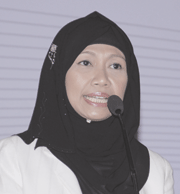Time to refocus lenses: Keynote address by Rabiatul Adawiah
 Of late there’s been a wave of global rediscovery of the vital importance of early childhood education (ECE). In countries around the world, there is growing acknowledgement of the critical contribution that education in the early years makes towards the overall development of children. Of greater significance though, is growing research data which suggests that investing in preschool education pays well, not just for children, but for societies and countries as a whole.
Of late there’s been a wave of global rediscovery of the vital importance of early childhood education (ECE). In countries around the world, there is growing acknowledgement of the critical contribution that education in the early years makes towards the overall development of children. Of greater significance though, is growing research data which suggests that investing in preschool education pays well, not just for children, but for societies and countries as a whole.
Economics Nobel laureate Dr. James Heckman, author of the Heckman equation, has conclusively demonstrated that countries which invest in high-quality preschool education, are reaping a wide range of benefits — better health and education outcomes, increased global competitiveness, social mobility and inclusiveness. He estimates that annual returns on investment in early childhood education range from 8-17 percent. Moreover in the Perry Preschool project, the return on ECE was calculated at seven times the investment for its lifelong effects. And with countries around the world including Singapore and India encouraging women’s participation in the workforce, there’s urgent need to increase child care and education centres.
With such rising awareness and social need, it’s no wonder there’s exponential increase and rapid expansion of ECCE (early childhood care and education) programmes, particularly in Asia. According to a recently released report of Unicef and Unesco, pre-primary enrolment in South Asia has nearly doubled, from 25 percent in 2000 to 47 percent in 2009. Inevitably, with increasing awareness of the importance of early childhood education for individual and national benefit, there’s been a mushrooming of ECE programmes giving rise to issues of availability, affordability and quality.
Issues of availability centre round the question of whether ECE constitutes a legal right, for at least one year. In most countries, there is a legal obligation to universalise primary and secondary education. But in several countries including China, Japan and India, among others, this right does not extend to preschool education. This may lead to a situation in which children from socio-economically disadvantaged households won’t be able to enjoy the positive impact of early education, leading to pernicious social and income inequalities.
The next issue is affordability of preschool education which is typically worst in countries where availability of ECE is limited, resulting in preschool education being expensive, often prohibitively so. In China for example, the monthly tuition fees of preschools in Beijing are up to six times higher than demanded by top local universities. Studies show that in general, the more widespread and available early education programmes are, the more affordable and accessible ECE becomes for children and families.
The next critical issue is of quality — the most important determinant of ECE. The key drivers of high-quality ECE are excellent teacher training, transparent curriculum guidelines and norms, and proactive parental awareness, engagement and involvement.
In the matter of teacher education, countries which insist on rigorous qualifications perform best in world rankings. Finland and South Korea, for example, require a minimum bachelor’s degree qualification, and governments proactively recruit the top 30 percent of graduates into ECE. Teachers are accorded the highest respect, given favourable working conditions, and attractive remuneration packages — on a par with other professionals. All this requires heavy financial commitment and support, and generous government funding and investment to raise the quality of the ECE workforce.
Amidst all these demands and challenges, we are also experiencing a changing landscape in terms of expectations from 21st century education, which requires strong focus on skills such as creativity, communication, collaboration, critical thinking, technology awareness and usage to prepare children for global citizenship. But to acquire and develop such skills and navigate an increasingly diverse, globalised and complex world, children must become familiar with competencies such as information and communications technology (ICT), and ecological and emotional literacies from early childhood. The child of tomorrow will need to be infused with the attitudes and dispositions of active global citizenship in her early years, so that she develops these attributes throughout her life.
Substantial advances in technology have, and will continue to profoundly affect the way children learn right from the start. In some of our Knowledge Universe preschools, children learn to use cameras, iPads, smartboards, projectors and computers. In contemporary classrooms, ICT is a very natural and spontaneous learning tool for discovering concepts and ideas, exploring the world, and for facilitating communication and collaboration within and beyond classrooms and the school. The classroom of the 21st century is a totally new environment, where information and communication are networked, digital, abundant, and promote borderless learning. Knowledge is not memorisation of facts, but is constructed through inquiry.
In recognition of the critical role that early childhood education plays in the development and nurturing of global citizens and the workforce of the 21st century and beyond, I encourage all of us here — early childhood education practitioners, leaders and policymakers — to refocus our lenses in perspectives and practice on the issues of accessibility, affordability and quality in early childhood education programmes.
(Rabiatul Adawiah is the Singapore-based chief operating officer (South-East Asia) of Knowledge Universe)















Add comment